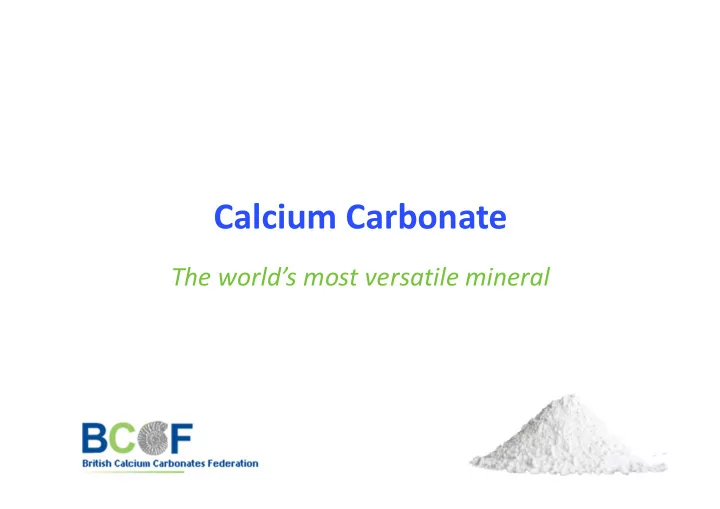

Calcium Carbonate The world’s most versatile mineral
What is Calcium Carbonate? Calcium carbonate is mineral composed of • three elements: carbon, oxygen and calcium. Calcium carbonate (CaCO 3 ) is a white, non-toxic and odourless solid. The earths crust contains more then 4% • calcium carbonate, making it one of nature's most abundant raw materials. Calcium carbonate is found as rock in all • parts of the world and is the main component of the shells of sea creatures and snails.
Calcium carbonate geology Calcium carbonate is normally found as a • white mineral (calcite) which occurs naturally in chalks, limestones and marbles. These rocks are classified as limestones, a • general term used for a rock possessing varying proportions of calcite and dolomite with small amounts of iron-bearing carbonates. Limestones are usually clear or white, but • with impurities, they can take on a variety of colours, commonly white, tan or grey.
Calcium carbonate production Commercial calcium carbonate is produced in two ways Through extraction Synthetically and processing of through chemical natural ores precipitation Ground calcium Precipitated Calcium carbonate is commonly Carbonate (PCC) is produced referred to as GCC through a recarbonisation process or as a by-product of some bulk chemical processes
British Calcium Carbonates Federation The BCCF is the UK trade body that represents the interests of • UK producers and suppliers of chalk, limestone, marble, dolomite and precipitated calcium carbonate (PCC). The federation was established over a 100 years ago to promote, • encourage, foster and develop the calcium carbonate industry in the UK. Today the BCCF provies 1,000 direct jobs and remains committed • to promoting the benefits of calcium carbonate to industrial users and consumers.
UK calcium carbonate operations BCCF members sites across the UK. Howie Minerals Omya UK Omya UK Imerys Omya UK Francis Flower Longcliffe Ben Bennett Lafarge Tarmac Francis Flower Specialty Omya UK Minerals Francis Flower Imerys
British Calcium Carbonates Federation BCCF represents members who • produce Calcium Carbonate powders and granules for industrial. The total UK production of • chalk/limestone powders and granules is 2 million tonnes. 95% of the chalk and limestone • produced is consumed in the UK Around 0.5 million tonnes of marble • is imported into UK each year.
Historical uses of calcium carbonate Calcium carbonate has been used from as • early as 40,000 BC. The major prehistoric use was the flints • within the chalk, that were used as tools. Calcium carbonate has been detected in nearly all prehistoric cave paintings Chalk, flint and gravel were used by the • Romans to construct road systems. In Roman Britain, Anglo-Saxons times and in • the Middle Ages, chalk was applied to the land as a fertiliser.
Calcium carbonate and the Industrial Revolution 1800s - the industrial revolution and demand for housing drives • the use of limewash 1840 - synthetic calcium carbonate first produced • 1860 - Linoleum first used, a durable floor covering containing • calcium carbonate 1880 - chalk powder was used in many household products • Late 1800s - mass production of glass using limestone. •
Modern calcium carbonate Calcium carbonate powders, precipitated products and • dolomite, are among the most important and versatile materials used by industry. Ground calcium carbonate (GCC) and precipitated calcium • carbonate (PCC) are used in an increasingly wide range of applications. The properties of commercial grades of calcium carbonate such • as fineness, particle size distribution and colour, have been optimised properties to meet technical requirements.
Ground Calcium Carbonate (GCC) The principal function of ground calcium carbonate (GCC) is • as a filler in a diverse range of end use applications GCC is defined as either low, medium or high grade filler. • The paper industry is the largest consumer of GCC • Plastics account for around 10% of European GCC • consumption. Around 8% of Europe’s GCC is accounted for by the paint • market The adhesives and sealants industry consumes around 5% • of European GCC production.
Uses of ground calcium carbonate (GCC) Adhesives and sealants • Animal and pet feeds • Carpet-backing • Construction (concrete, plasters, asphalt) • Environment (desulphurisation of flue gas) • Fertilisers and agricultural liming • Food and pharmaceuticals • Glass and ceramics • Household products • Paints and surface-coatings • Paper • Plastics and composites • Rubber and elastomers •
Uses of precipitated calcium carbonate (PCC) • Cosmetics and toiletries • Food and pharmaceuticals • Paints and inks • Paper • Plastics • Sealants and adhesives
Opportunities and industry growth • The GCC market is expected to continue to grow over the next few years. • In Europe, GCC in paper applications has been growing at 4%, and industry filler demand should track growth in this sector. • As demand for filler minerals increases, GCC will benefit as a high quality and comparatively low price product. • Demand from the paints and plastics markets is steady. All of this is provides a pretty positive outlook for GCC as these three markets combined account for about 8% of total demand in Europe.
Opportunities and industry growth • The GCC market is trending towards finer and higher brightness grades, and fillers that allow customers to achieve production cost reductions. • GCC producers must continue developing and supplying high performance products of consistent quality that are value for money. • All of this requires investment and the challenge to the GCC industry is to satisfy this demand, while keeping a handle production costs and margin.
Contact the BCCF Tel: +44 (0)1482 635 800 Fax: +44 (0)1482 632 481 Web: www.calcium-carbonate.org.uk
Recommend
More recommend